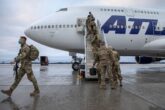September 17, 2019
The U.S. Military is Not, and Can Never Be, Afghanistan’s Police
In 1829, the father of modern policing, Sir Robert Peel, established “Peel’s Principles” to describe the role of police at large. Almost 200 years later, policing has changed considerably, but the basic premise of preventing crime, earning public support, and respecting community principles has not.
Our military has worked hard to set the conditions for a departure from Afghanistan, but we have not been policing. Our military activities in Afghanistan include police assistance as part of our larger mission set, but if the hardest activities left to accomplish were merely that, then it would mean the need for military force would have subsided already, thanks to good governance, and flourishing public support across Afghan communities. It would mean we would have already won.
Peel’s first principle argues that police are “an alternative to the repression of crime and disorder by military force.” While in today’s world it is perhaps easy to call everything short of war “policing,” it is not accurate to do so. What the United States currently provides in Afghanistan is security, backed by force, and informed by American policy. To call military action in Afghanistan “policing” diminishes the difficulty of both endeavors and enables a false narrative that muddies hard policy decisions.
Read the full article in Defense One.
More from CNAS
-
Afghanistan: Why Does Trump Want to Retake Bagram Air Base?
Lisa Curtis, senior fellow and program director at the Center for a New American Security joined Deutsche Welle to discuss President Trump's comments on the U.S. regaining con...
By Lisa Curtis
-
A Failure to Plan: Examining the Biden Administration’s Preparation for the Afghanistan Withdrawal
Afghanistan, Iraq, and Vietnam. One failure is a horrible accident; two failures are a tragic coincidence; three failures are a disturbing trend that shows the U.S. government...
By Christopher D. Kolenda
-
Against All Odds
Eighteen months after taking power, the Taliban is intensifying its repression of Afghan civil society and cracking down on the rights and freedoms of all Afghans, especially ...
By Lisa Curtis, Annie Pforzheimer & Jan Mohammad Jahid
-
To Help Afghanistan, Engage Its Political Opposition
The effort to help Afghans shape a better alternative should begin now....
By Richard Fontaine & Lisa Curtis




